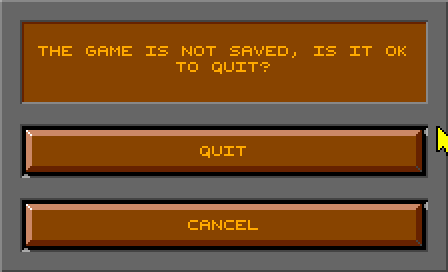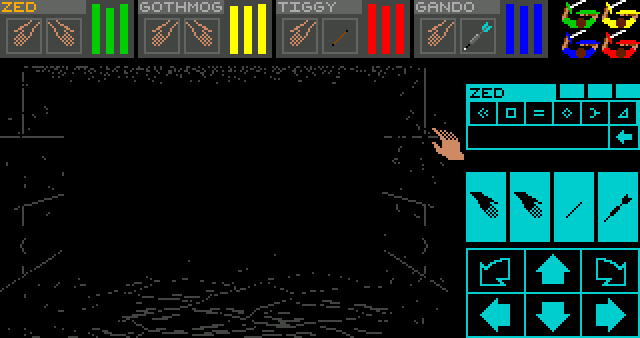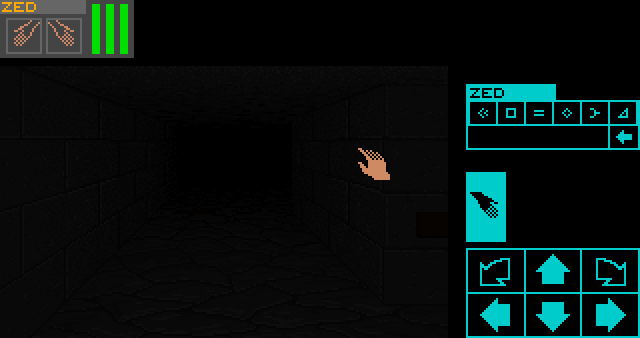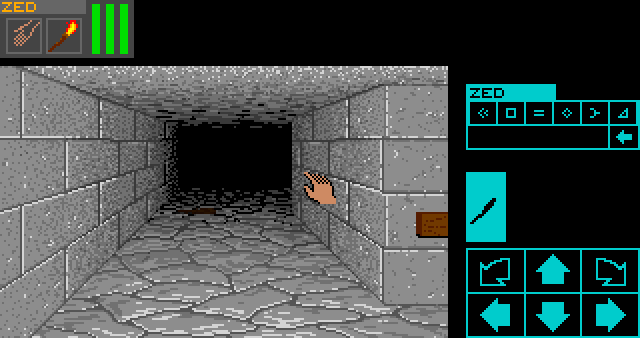Downloads
Executable for the map editor (Windows 32bits)
Executable for the game (Windows 32bits)
Before you try to compile the code go to the "Projects" tab on the left menu, select the "Run" settings for your kit,
and set the "Working directory" to the path of "editor\data" for the editor or "game\data" for the game.
Rethinking the time

I also didn't have time to talk about the time in these dialogs.
While we are int these boxes, choosing to save the game, typing the file name, and so on, we don't want to be attacked
by a monster at the same time. So the game time should be paused.
There are a few ways for the player to act on the time flow in the game.
You can stop the time by pausing the game, or you can sleep to make it run faster - even though after looking at the code
of the original game, it is not clear that anything was faster during sleep except the health/stamina/mana regeneration.
Controling the time is particularly important with spells like "magic torch" that can last for a long time.
In the original game they used what they called a "timeline". It was a global time counter and a list of events that should happen
at a given time.
This method had some advantages, but also drawbacks. For example the main counter could overflow...
We will use a much simpler method where every spell has it's own timer.
But we also will handle the other timers we are already using.
Throughout the code, we used several frame counters that were coded the same way:
if (counter != 0)
{
counter--;
if (counter == 0)
{
[...]
}
}
Its update function should be familiar:
bool CTimer::update()
{
int speed = 1;
if (mTime != 0)
{
if (mFollowGameTime)
speed = getGameTimeFactor();
mTime -= speed;
if (mTime <= 0)
{
mTime = 0;
return true;
}
}
return false;
}
flows.
int CTimer::getGameTimeFactor()
{
if (interface.isGamePaused() == true)
return 0;
else if (interface.isSleeping() == true)
return 4;
return 1;
}
And I coded the pause and the sleep screens:


Light
Every level except the first one are dark.
This is what it looked like in the original game.

There was only 6 levels of lighting, but we will use more.
I wrote a darkenRect() function that work as the darken() we already used but only on a rectangle of the image.
void CGraphics2D::darkenRect(QImage* image, float opacity, CRect destRect)
{
QImage shadowImage(image->width(), image->height(), QImage::Format_ARGB32);
shadowImage.fill(QColor(0, 0, 0, 0));
rect(&shadowImage, destRect, QColor(0, 0, 0), true);
QPainter painter(image);
painter.setOpacity(opacity);
painter.setCompositionMode(QPainter::CompositionMode_SourceAtop);
painter.drawImage(QPoint(0, 0), shadowImage);
painter.setCompositionMode(QPainter::CompositionMode_SourceOver);
painter.setOpacity(1.0f);
painter.end();
}
void CGame::displayMainView(QImage* image)
{
if (interface.isInInventory() == false &&
interface.isGamePaused() == false &&
interface.isSleeping() == false)
{
CRect mainRect(CVec2(0, 33), CVec2(MAINVIEW_WIDTH - 1, 33 + MAINVIEW_HEIGHT - 1));
[...]
// light
if (currentLevel != 1)
{
float level = getLightLevel();
if (level != MAX_LIGHT_LEVEL)
graph2D.darkenRect(image, 1.0f - level, mainRect);
}
}
}
Torches
The light they produce is proportionnal to these charges. So it will slowly decrease.
First we have to add a charges parameter to "items.xml":
<!-- TORCH -->
<item name="ITEM003">
[...]
<param type="int">Charges</param>
</item>
But the only torches that we can use are either the one in the ZED's inventory or torches on torch-holders.
These ones do not appear in the editor. So I wrote a function to initialize their charges at the begining.
void CObjects::setDefaultParams(CObject* obj)
{
if (obj->getType() == OBJECT_TYPE_TORCH)
{
obj->setIntParam("Charges", TORCH_MAX_CHARGES);
}
}
void CCharacter::update()
{
if (bodyObjects[eBodyPartLeftHand].getType() == OBJECT_TYPE_TORCH)
{
CTimer t;
t.set(bodyObjects[eBodyPartLeftHand].getIntParam("Charges"), true);
t.update();
bodyObjects[eBodyPartLeftHand].setIntParam("Charges", t.get());
}
if (bodyObjects[eBodyPartRightHand].getType() == OBJECT_TYPE_TORCH)
{
CTimer t;
t.set(bodyObjects[eBodyPartRightHand].getIntParam("Charges"), true);
t.update();
bodyObjects[eBodyPartRightHand].setIntParam("Charges", t.get());
}
[...]
}
change the way they are displayed.

void CInterface::drawBodyPart(QImage* image, CVec2 pos, int championNum, CCharacter::EBodyParts part, bool enableArea)
{
[...]
if (objType != 0)
{
[...]
// torch
if (part == CCharacter::eBodyPartRightHand ||
part == CCharacter::eBodyPartLeftHand)
{
if (objType == OBJECT_TYPE_TORCH)
{
int charges = obj->getIntParam("Charges");
if (charges > 0)
imageNum = 5 + ((charges - 1) * 3) / TORCH_MAX_CHARGES;
}
}
CRect rect = getItemRect(imageNum);
graph2D.drawImageAtlas(image, pos, objImage, rect);
}
[...]
}
Well in fact, there was a little bug in the code, and the 5th torch was not always the 5th more powerful...
Then they added the powers, taking the full power of the 1st one, half of the power of the 2nd, a quarter of
the power of the 3rd, and so on.
So here is the code to do that:
float CGame::getLightLevel()
{
int power = 0;
// get the powers of the torches in che champions' hands
int torches[8];
int numTorches = 0;
CObject* obj;
for (int i = 0; i < 4; ++i)
{
CCharacter* c = &game.characters[i];
obj = &c->bodyObjects[CCharacter::eBodyPartLeftHand];
if (obj->getType() == OBJECT_TYPE_TORCH)
torches[numTorches++] = obj->getIntParam("Charges");
obj = &c->bodyObjects[CCharacter::eBodyPartRightHand];
if (obj->getType() == OBJECT_TYPE_TORCH)
torches[numTorches++] = obj->getIntParam("Charges");
}
// sort the torches
for (int i = 0; i < numTorches - 1; ++i)
for (int j = i + 1; j < numTorches; ++j)
if (torches[i] < torches[j])
{
int temp = torches[i];
torches[i] = torches[j];
torches[j] = temp;
}
// get the 5 most powerful torches (as in the original game)
for (int i = 0; i < MIN(numTorches, 5); ++i)
power += (torches[i] >> i) / 545;
[...]
}
Light spells
The light spell is only a stronger magic torch, and the darkness spell reduces the light for a short amount
of time.
Spells produce the same light power during their whole duration. At the end, in the original game, they used
a trick of the timeline to decrease their power quickly but not instantly.
I simulated this with a "decrease time".
But let's see the class we will use to store a spell in the new file "spells.h":
enum ESpells
{
eSpell_MagicTorch,
eSpell_Light,
eSpell_Darkness,
eSpell_Count
};
class CSpell
{
public:
int getPower();
[...]
ESpells spell;
int power;
CTimer time;
int decreaseTime;
};
- spell is the type of the spell.
- power is its light power.
- time is the total duration of the spell - including the decrease time.
- decreaseTime is the duration of the decrease effect.
The getPower() function returns the current power depending on the time elapsed:
int CSpell::getPower()
{
if (time.get() >= decreaseTime)
return power;
else
return (power * time.get()) / decreaseTime;
}
class CSpells
{
public:
CSpells();
void cast(int champion);
void update();
[...]
std::vector<CSpell> mActiveSpells;
};
extern CSpells spells;
gets to 0.
The cast() function will decode the "spell string" of the given champion and add the corresponding spell
to the list.
void CSpells::cast(int champion)
{
CCharacter* c = &game.characters[champion];
char* spell = c->spell;
int level = spell[0] - 'a';
// magic torch
if (strcmp(&spell[1], "j") == 0)
{
CSpell s;
s.spell = eSpell_MagicTorch;
s.power = (level + 4) * 16;
s.decreaseTime = (level + 4) * 60;
s.time.set(41250 + level * 8000 + s.decreaseTime, true);
mActiveSpells.push_back(s);
return;
}
// light
else if (strcmp(&spell[1], "ipw") == 0)
{
CSpell s;
s.spell = eSpell_MagicTorch;
s.power = (level * 2 + 4) * 16;
s.decreaseTime = (level * 2 + 4) * 60;
s.time.set(156250 + level * 32000 + s.decreaseTime, true);
mActiveSpells.push_back(s);
return;
}
// darkness
else if (strcmp(&spell[1], "kpx") == 0)
{
CSpell s;
s.spell = eSpell_MagicTorch;
s.power = -(level + 3) * 16;
s.decreaseTime = (level + 3) * 60;
s.time.set(1531 + s.decreaseTime, true);
mActiveSpells.push_back(s);
return;
}
std::string message = interface.setChampionNameInString(champion, "MESSAGE01");
interface.addMessage(message, 4);
}
I tried to set power levels and times as close as possible as the original game, but it was difficult
to tell because of the only 6 levels of darkness.
Spells powers are simply added to the torches in getLightLevel():
// magical spells
for (size_t i = 0; i < spells.mActiveSpells.size(); ++i)
{
CSpell* s = &spells.mActiveSpells[i];
if (s->spell == eSpell_MagicTorch ||
s->spell == eSpell_Light ||
s->spell == eSpell_Darkness)
{
power += s->getPower();
}
}
Final light calculation
// compute the global light level
float level = ((float)power / 256.0f) * (MAX_LIGHT_LEVEL - MIN_LIGHT_LEVEL) + MIN_LIGHT_LEVEL;
if (level > MAX_LIGHT_LEVEL)
level = MAX_LIGHT_LEVEL;
return level;
Here is what level 2 looks like with no light at all:

And with a simple torch:

Mana
The cost of each symbol was easy to code thanks to Dungeon Master Encyclopaedia:
int CSpells::getMana(int champion, char symbol)
{
CCharacter* c = &game.characters[champion];
char* spell = c->spell;
if (spell[0] == 0)
{
return symbol - 'a' + 1;
}
else
{
int level = spell[0] - 'a';
static const int costs[] =
{
2, // g = Ya
3, // h = Vi
4, // i = Oh
5, // j = Ful
6, // k = Des
7, // l = Zo
4, // m = Ven
5, // n = Ew
6, // o = Kath
7, // p = Ir
7, // q = Bro
9, // r = Gor
2, // s = Ku
2, // t = Ros
3, // u = Dain
4, // v = Neta
6, // w = Ra
7 // x = Sar
};
return (costs[symbol - 'g'] * (level + 2)) / 2;
}
}
In the original game, the formula to regenerate the mana was quite complex.
It implied 3 different timers, the wizard skill, the wisdom skill, the priest skill, and the maximum mana
value of a character. An it also consumed stamina.
I will perhabs code this one day - once we will have the character's skills at least. But for now I wanted
a quick thing to test.
Anyways, this formula was only important when the character had a high level.
I started the game and played a little bit with ZED and I found that when he was awake, he gained 1 point of
mana every 30 seconds. So I used a simple timer to simulate this:
void CCharacter::update()
{
[...]
// mana regeneration
if (manaRegenTimer.update() == true)
{
if (portrait != -1)
if (stats[eStatMana].value < stats[eStatMana].maxValue)
stats[eStatMana].value++;
[...]
manaRegenTimer.set(MANA_REGEN_TIMER, true);
[...]
}
}
ZED regains its full mana in about 10 seconds while sleeping. That's 30 time the speed of the
regeneration when he's awake.
So I had to set another value for the timer and to write function so that CInterface signals
CCharacter when we enter or leave the sleep mode. And I set the timers to one value or another in
these functions.
void CCharacter::enterSleep()
{
manaRegenTimer.set(MANA_REGEN_TIMER_SLEEP, true);
}
void CCharacter::exitSleep()
{
manaRegenTimer.set(MANA_REGEN_TIMER, true);
}
Save and other things
So I added save and load functions to all the implied classes.
They are not more complex that the other save functions we already saw.
There must be a bug in the save as the file is getting very big when we save in level 2.
I'll have to investigate that.
As I said, I forgot to talk about the illumulet in this part. It will be for another one.
There is also a few other thing to say about the sleep, as it modifies some other parameters.
I.e. the dexterity of the champions are greatly reduced.
But that's already a big part. So, see you soon.